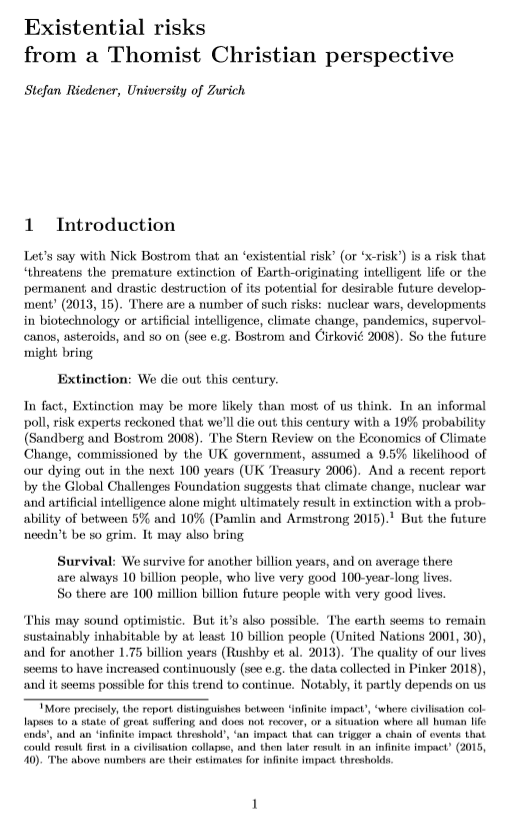Existential risks from a Thomist Christian perspective
Stefan Riedener (University of Zurich)
GPI Working Paper No. 1-2021, published in Effective Altrusim and Religion
Let’s say with Nick Bostrom that an ‘existential risk’ (or ‘x-risk’) is a risk that ‘threatens the premature extinction of Earth-originating intelligent life or the permanent and drastic destruction of its potential for desirable future development’ (2013, 15). There are a number of such risks: nuclear wars, developments in biotechnology or artificial intelligence, climate change, pandemics, supervolcanos, asteroids, and so on (see e.g. Bostrom and Ćirković 2008). [...]
Other working papers
Tiny probabilities and the value of the far future – Petra Kosonen (Population Wellbeing Initiative, University of Texas at Austin)
Morally speaking, what matters the most is the far future – at least according to Longtermism. The reason why the far future is of utmost importance is that our acts’ expected influence on the value of the world is mainly determined by their consequences in the far future. The case for Longtermism is straightforward: Given the enormous number of people who might exist in the far future, even a tiny probability of affecting how the far future goes outweighs the importance of our acts’ consequences…
Against Anti-Fanaticism – Christian Tarsney (Population Wellbeing Initiative, University of Texas at Austin)
Should you be willing to forego any sure good for a tiny probability of a vastly greater good? Fanatics say you should, anti-fanatics say you should not. Anti-fanaticism has great intuitive appeal. But, I argue, these intuitions are untenable, because satisfying them in their full generality is incompatible with three very plausible principles: acyclicity, a minimal dominance principle, and the principle that any outcome can be made better or worse. This argument against anti-fanaticism can be…
Exceeding expectations: stochastic dominance as a general decision theory – Christian Tarsney (Global Priorities Institute, Oxford University)
The principle that rational agents should maximize expected utility or choiceworthiness is intuitively plausible in many ordinary cases of decision-making under uncertainty. But it is less plausible in cases of extreme, low-probability risk (like Pascal’s Mugging), and intolerably paradoxical in cases like the St. Petersburg and Pasadena games. In this paper I show that, under certain conditions, stochastic dominance reasoning can capture most of the plausible implications of expectational reasoning while avoiding most of its pitfalls…

